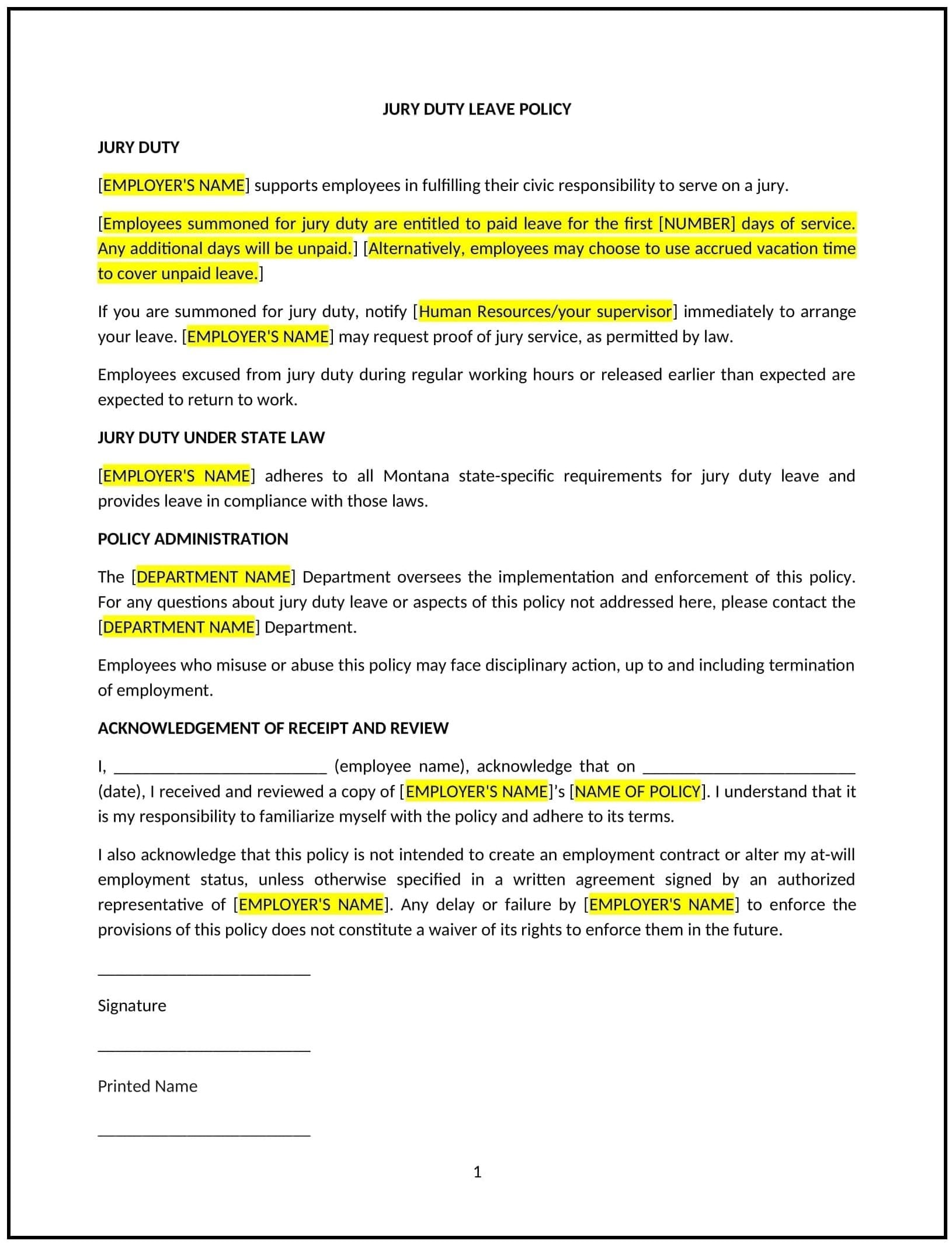Got contracts to review? While you're here for policies, let Cobrief make contract review effortless—start your free review now.

Customize this template for free
Jury duty leave policy (Montana)
A jury duty leave policy helps Montana businesses manage employee absences due to jury service. This policy outlines the company’s approach to providing paid or unpaid leave for employees called to serve on a jury, including how to request leave, documentation requirements, and job protection during jury duty.
By implementing this policy, businesses can support employees' civic duties, ensure fair treatment for employees participating in jury duty, and maintain workplace efficiency.
How to use this jury duty leave policy (Montana)
- Define eligibility for jury duty leave: The policy should outline who is eligible for jury duty leave, including full-time and part-time employees. It should also specify any waiting periods or length of service requirements for eligibility.
- Specify pay during jury duty: The policy should clarify whether employees will receive paid or unpaid leave for jury service. In Montana, employers are generally not required to pay employees for jury duty, but the policy can outline any company-specific benefits or paid leave options.
- Set procedures for requesting leave: The policy should establish a process for employees to request jury duty leave, including required notice, documentation (such as a jury summons), and the timeline for informing the company about the need for leave.
- Outline job protection: The policy should ensure that employees are entitled to return to their same or equivalent position after completing jury service, as required by law. The business should outline how employees will not be penalized for taking leave to fulfill jury duties.
- Address the use of paid time off (PTO): The policy should specify whether employees are allowed to use paid time off (such as vacation or sick leave) during jury duty if the leave is unpaid, and how PTO will be applied.
- Review and update regularly: The policy should be reviewed periodically to ensure it aligns with any changes in state laws or business practices and remains relevant to employee needs.
Benefits of using this jury duty leave policy (Montana)
This policy provides several key benefits for Montana businesses:
- Supports civic duty: Providing jury duty leave demonstrates the business’s commitment to supporting employees' civic responsibilities and ensuring they have the opportunity to serve on a jury when required.
- Reduces workplace disruption: Clear guidelines for managing jury duty leave help businesses plan for employee absences, minimizing disruptions and maintaining productivity.
- Enhances employee morale and trust: Employees who feel supported in fulfilling their civic duties are more likely to have higher job satisfaction and trust in the company.
- Promotes fairness and equity: The policy ensures that all employees, regardless of role or seniority, are treated fairly and given the opportunity to participate in jury service without facing negative consequences.
- Demonstrates legal compliance: The policy helps the business comply with local, state, and federal laws governing jury duty leave, reducing the risk of legal disputes or penalties.
Tips for using this jury duty leave policy (Montana)
- Communicate the policy clearly: Ensure that all employees are aware of the jury duty leave policy, including how to request leave, what documentation is required, and the potential impact on their pay.
- Be flexible with scheduling: When possible, accommodate employees’ schedules by allowing them to adjust their work hours or use PTO to cover unpaid leave, ensuring that their work responsibilities are met.
- Track jury duty absences: Keep records of employees' jury duty leave to ensure proper job protection and compliance with the policy. This also helps with workforce planning.
- Support employees with jury duty: Ensure that employees are informed about their rights and responsibilities during jury service, including how they will be compensated and when they can return to work.
- Review the policy regularly: Periodically review the jury duty leave policy to ensure it reflects any changes in state or federal laws, business practices, or employee feedback.